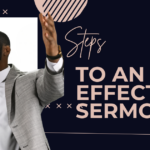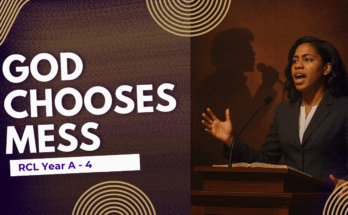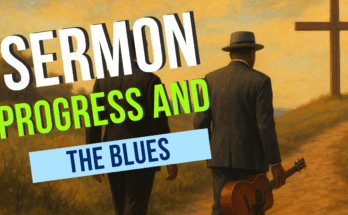As an Amazon Associate I earn from qualifying purchases.
In the book, Blow the Trumpet in Zion, Renita Weems has a sermon entitled: Running the Race for Future Generations: Can You Handle the Faith Without Fulfillment? The Sermon’s text is essentially the Book of Hebrews. Weems notes that the author of Hebrews exegetes the whole of the Hebrew Bible and Hebrew history as the longings and journey from a struggle, through a struggle, and to a struggle.
Waiting in a Hostile Environment
The book of Hebrews was written to Christians who have been around much longer than was anticipated. During this waiting time, the community found itself in a hostile environment. The community life degenerated into mere differences of opinion on many issues as they attempted to live in this waiting time. There were delayed promises. What do you do while you are in between “words from God?” What do you do when you have heard the voice of God in the past but today you hear nothing and can only hope to hear that voice again? That is the theme of the sermon.
Weems sees in the book of Hebrews a call to hold to the tradition that has brought us to the point where we are today. Weems sees in the book of Hebrews a summary of the tradition as a call to hold on to faith.
Arguing over Less Important Things
Weems helpfully weaves in contemporary experiences by noting that the church today is arguing over such things as whether there should be Bishops in the Baptist church while at the same time we are going to war in Iraq and homeless are in the street and teenagers are getting pregnant. Thus she notes a kinship between the waiting of the community that Hebrews was written to and our Christian communities today.
We Must Live by Faith
Also she illustrates the living in this period of waiting by also weaving in experiences such as a daughter getting pregnant, son going to jail, or a fearful diagnosis from the doctor. She also notes that during this waiting time we may find that those who have not necessarily followed the road we are on may appear more successful. For example, the minister who didn’t go to the schooling that we have submitted to and yet their church is much bigger than ours and their life seems more together.
But the Book of Hebrews tells us, according to the sermon, that if we are to live in the silence we are to live by faith, not seeing the promise. We will not see what we are working towards. Weems takes up the previous example and notes that we are going to have to preach to 5 like it is 5000. We are going to have to live with blessings that don’t always bless and successes that seem to have failure laced in them. It is Faith that allows us to live in this time of waiting.
There is an element of LaRue’s Care of the Soul domain in this sermon in that Weems articulates the pain and suffering that many ministers will feel while living and working for Christ. There is also an element of Corporate Concerns in that we are led to live for the community. The community is primarily African American women preachers and secondarily the African American community at large. This is accomplished in the sermon largely by the illustrations that are used.
In the sermon, the faith that Hebrews calls us to propels us because we are a part of a community. Weems says that she has no right to stop because she owes those who were faithful in the past and are faithful today even though they have not fully received the promise. Examples are: Jerena Lee, Ella Baker, and Ella Mitchell. In a particularly African move she also includes the unborn in the community of witnesses.
Run the Race
Finally in typical African American style Weems finishes the sermon with a celebration. She states “Therefore let us run this race with patience, looking to Jesus.” She uses the biblical metaphor of a relay race. Here there are some who have gone on before us. They have run a good race. The reason we are in the position we are in now is because they ran their leg of the race well. But they didn’t see the finish line. They pass the baton to us and we are to run. We may not see the finish line, but we owe it to the community to run the race well. Weems notes that when she gets finished running she is going to pass the baton to somebody else. She may not cross the finish line, but faith says somebody is going to cross the finish line if we all just keep looking to Jesus the author and finisher of our faith.
Amazon and the Amazon logo are trademarks of Amazon.com, Inc, or its affiliates.





